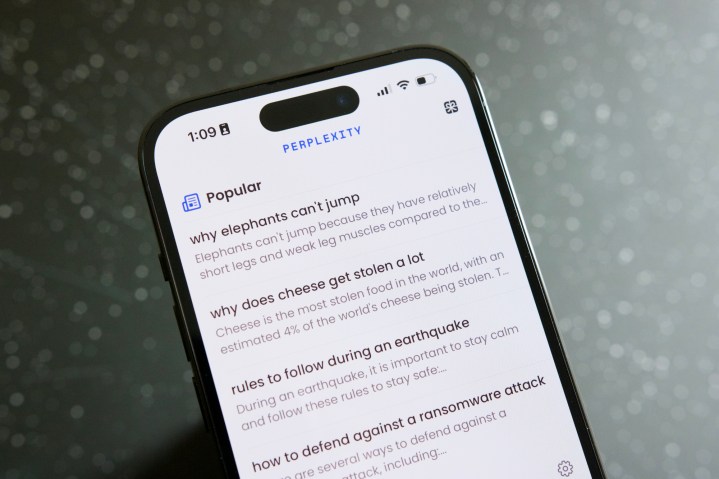Offering a unique take on web search, Perplexity has been a hit among its users (and a bane to its sources) since its debut last year. It’s certainly become one of the most popular new AI tools to check out, perhaps second only to ChatGPT itself, which it’s powered by.
Here’s how the generative AI “answer engine” works and how to get started on using it.
What is Perplexity AI?

Perplexity is an AI search engine that scrapes information from the web and synthesizes answers to a user’s query though a chatbot interface. You can ask it just about any question, and it will respond with cited information via a conversational reply.
It differs from traditional search engines like Google in that it doesn’t simply provide you a list of sites where you can find the information you’re searching for. Rather, it scrapes those sites and provides said information directly. And, unlike traditional chatbots, Perplexity doesn’t have a knowledge cutoff date, so the information it provides is always up-to-date. However, it is limited by the information in its search results. If the sites it’s pulling data from are not reliable sources, then the answers that Perplexity provides May not be entirely accurate.
In October 2024, Perplexity released a pair of new features to improve its functionality: Internal Knowledge Search and Spaces. Internal Knowledge Search enables the AI to search the personal files of users and organizations in addition to the web to peovide more accurate and tailored responses. Spaces, on the other hand, operates as a collaboration hub (much like Anthropic’s Artifacts or ChatGPT’s Canvas) that allows the user to see a preview of the code or content that’s being generated in a window that’s separate from the chat itself.
The company announced in November 2024, that it has begun experimenting with integrating “sponsored follow-up questions and paid media positioned to the side of an answer.” The company has also introduced a shopping tool that it describes as a “one-stop solution where you can research and purchase products.”
Perplexity’s format has spawned a copy from rival ChatGPT as well. Released in October 2024, ChatGPT Search does exactly what Perplexity does; it pulls information from the wider internet and uses it to generate an up-to-date conversational answer to the user’s question. Perplexity AI available through the Perplexity website and the Mac desktop, as well as on iOS and Android.
When was Perplexity released?
Perplexity the company was founded in August 2022 by Aravind Srinivas (CEO), Denis Yarats (chief technology officer), and Andy Konwinski. That December, the company announced its first commercial product, Perplexity Ask. The following January, Perplexity released new features for Ask, including up-to-date sourcing in its replies and the ability for the user to ask follow-up questions.
On Februrary 8, 2023, the company rebranded its chatbot system to just, “Perplexity” and released a Chrome extension of the same name. By March 2023, the company boasted 2 million monthly active users. That figure, as of October 2004, is up to around 15 million monthly actives.
Getting started with Perplexity

If you want to try Perplexity for yourself, head over to perplexity.ai/. You can play around with the AI for free and without needing to sign in. However, if you want to save your chat search history for future reference, you’ll need to sign up for a free account. Just click the Sign Up button in the lower-left corner of the screen, link either your Google or Apple account (or use a single sign-on with your company email account), and away you go. On your first login, you’ll need to scroll through the site’s introductory screens, which go over the basics of the AI and also shows ads for its Pro service and mobile apps.
On the left-hand navigation bar, you can choose between the home tab, which is where you can chat with the AI directly; the Discover tab that rounds up news stories for you to peruse; Spaces, which allows you to upload your documents and set behavioral instructions for the AI to follow; and Library, where you can manage your threads (“a full back-and-forth conversation with Perplexity” that “includes your initial question, any follow-up queries, and all of Perplexity’s responses,” per the company).
The focus menu under the prompt window enables you to dictate where the AI searches for its information, whether that’s the wider web, academic publications, or video and social media sites. There’s also an option for math-specific questions and text-generation requests. The attach button to the right of the focus menu does what it says it does and allows you to upload files and PDFs to augment your prompt. Just note that free tier users are limited to three file uploads per day. The Pro search toggle allows you to run up to three Pro searches per day that dig through twice the number of websites that regular “quick” searches do.
What is Perplexity Pro?
Perplexity Pro is the premium subscription tier of the AI. It costs $20 per month (which is in line with the rest of the industry) and offers unlimited quick searches and 300 Pro searches per day; your choice of foundational model including GPT-4o, Claude-3, and Sonar Large (LLama 3.1); unlimited file uploads; access to image generators like Playground AI, DALL-E, and SDXL for data visualizations; and a $5 monthly API credit.
Perplexity controversies
Perplexity’s data-scraping practices has not made it any friends among the websites and publications it cites. In 2024 alone, the AI startup has been accused of “willful infringement” by Forbes’ Chief Content Officer Randall Lane, and has been sent cease-and-desist orders from both Conde Nast and the The New York Times.
The company is also currently being sued by NewsCorp over allegations that Perplexity has committed copyright infringement on a “massive scale.”





